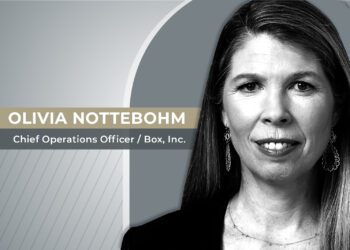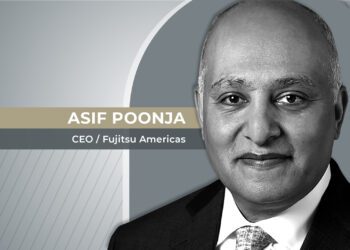Chairman of the Board and CEO Tetsuji Kawamura explains how Sharp Americas is making a historic comeback.
A household name for many years, Japanese-Taiwanese electronics giant Sharp Corporation has been through difficult times over the past decade. Yet since Taiwan-based Foxconn became a majority shareholder in 2016, the message that Chairman of the Board and CEO of Sharp Electronics Corporation, Tetsuji Kawamura, wants to send to the world is that Sharp is ready to go again, and the company has a range of new cutting edge technology and product offerings to see it get there.
“In 2012, Sharp as a corporation had been struggling financially,” Kawamura told CEO Magazine in an exclusive interview. “It was very much in survival mode. Yet when I came over to the Americas two years ago, Foxconn had already been a majority shareholder for just over a year. When they came in, lots of improvements were made financially. Now, a few years into our relationship, our business has stabilized and we are ready to grow again.”
Sharp Electronics Corporation (SEC) is a wholly owned US subsidiary of Osaka-based Sharp Corporation, which was founded in 1912 in Tokyo and would eventually grow into a multinational company known worldwide for its one-of-a-kind electronic products and solutions.
Sharp, which sees AI and smart technology as key elements of its current growth strategy, currently boasts a range of offerings from TVs to kitchen appliances and B2B solutions, and boasted global revenue of $21.5 billion across its various segments in 2018.
Accelerating growth
Sharp currently has set a growth strategy based upon capturing the most sought after AI and smart technology, as well as a desire to reestablish product segments it had dominated in the past, such as household appliances, through embracing that technology and jointly developing new products with Foxconn.
“One of the most obvious growth areas for us is the TV business,” Kawamura explained. “So, this year we are buying back the TV license from Chinese manufacturer Hisense, which we sold in 2015. We anticipate that this will give us much more growth in the consumer electronics business area. Technology-wise, we are currently leading the market in 8K display technology, which is gaining in popularity and will provide us with plenty of opportunities in the progressional display and camcorder dimension as well.”
“Most of our B2B business today comes from sales of multi-functional printer technology,” he added. “And this segment continues to grow quickly because of our leading technology and wonderful customer service. However, we have been increasing our business coverage through providing IP and manage network services as well.
“As far as Sharp Americas is concerned, since our first direct sales and services branch opened in Arizona in 2006, we have grown to 56 direct branch locations throughout the US, providing a local, caring service for our customers right where they live. This direct branch business complements our growing office technology dealer partner growth and provides a bit more control to move into new businesses. Put together, those are the opportunities I became aware of since I became the CEO of Sharp US.”


Foxconn + Sharp
According to Kawamura, Foxconn’s $3.8 billion 2016 takeover of Sharp Corporation has been absolutely crucial in every area from procurement and production to logistics. Taiwan-based Foxconn manufactures approximately 40% of global electronics products and generates around $150 billion in annual revenues with over 1 million employees worldwide. The fact that the company enjoys cross partnerships with major names in technology, such as Apple, Amazon, AT&T, and Microsoft is another clear advantage that Kawamura sees for Sharp in the coming years.
“This allows us to have our feet under the table of the major players and work with them in providing our customers the product they want in both the B2B and B2C markets,” he highlighted. “Through Foxconn, we have leading HR technology, and as you may know, we are the pioneer of LCD technology. Access to leading technologies is always a difference maker for a brand like Sharp.”
In order to increase its business coverage, Sharp has also been acquiring network service companies as well as partnering with various IP service providers with a view to providing not only hardware but also smart technology that will enable business users to meet face to face remotely in a more convenient and productive way. Likewise, in the home appliance area, where the majority of its business comes from microwave ovens, Kawamura highlighted how Sharp is looking to expand its offerings to grow the range of smart appliances and products to entire kitchen suites.
“Already, many of our products are connected to the Internet, so the next step will be to enable them to function using AI to make our customers’ lives easier,” Kawamura emphasized. “Of course, our competition is very harsh in this kind of market. You need the best technology and the highest level of competitiveness, and thankfully, our relationship with Foxconn ensures that we have both.”
Operational excellence
Kawamura explained how Sharp US’s core competency focus is currently on its sales, marketing, and customer service divisions, while the company outsources other business functions through its partnership with Foxconn, enabling common functions, such as IP, HR, finance, and supply chain to operate with lower overheads.
“Because we are in a wide range of business areas from consumer electronics to B2B we make sure each of these has the expertise needed to do those individual business functions,” Kawamura highlighted. “Regarding the next 12 to 18 months, however, those overheads are likely to grow, so we always have to be focused on operational excellence, and in doing that, we’ll seek full advantage of the resources that Foxconn can provide.”
Key partnerships
Along with its crucial relationship with Foxconn, Kawamura cited another key strategic partner in its B2B area as Tech Data, which not only provides Sharp with logistical support, but also gives its dealers access to many other products that Sharp itself does not produce, creating what he described as a “one-stop-shop” for IT-related technologies.
“This enables our customers to reach many products, including non-Sharp products, and also provides us with a quick turnaround of the order cycle,” Kawamura stressed.
Ultimately, Tetsuji Kawamura is adamant that while Sharp has been through tough times, the company is ready to go—and grow—again, in large part through the core partnerships it has managed to cultivate and a staunch desire to compete in increasingly tough consumer electronics and B2B markets. “When I took on my current role in 2017, the goal I had can be summarized in two words: accelerate growth,” Kawamura explained. “Sharp is ready to go again.”












